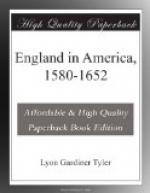Marriage was a mere civil contract, and the burials took place without funeral service or sermon. Stern laws were made against card-playing, long hair, drinking healths, and wearing certain articles, such as gold and silver girdles, hat-bands, belts, ruffs, and beaver hats. There were no Christmas festivals and no saints’ days nor recognized saints, though special feasts and thanksgiving days were frequent.[25] The penal legislation of New England was harsh and severe, and in Massachusetts and Connecticut there were fifteen crimes punishable with death, while the law took hold also of innumerable petty offences. In addition the magistrates had a discretionary authority, and they often punished persons on mere suspicion.
There can be no doubt that the ideal of the educated Puritan was lofty and high, and that society in New England was remarkably free from the ordinary frivolities and immoralities of mankind; but it would seem that human nature exacted a severe retaliation for the undue suppression of its weaknesses. There are in the works of Bradford and Winthrop, as well as in the records of the colonies, evidence which shows that the streams of wickedness in New England were “dammed” and not dried up. At intervals the impure waters broke over the obstacles in their way, till the record of crime caused the good Bradford “to fear and tremble at the consideration of our corrupt natures."[26]
The conveniences of town life gave opportunities for literature not enjoyed by the Virginians, and, though his religion cut the Puritan almost entirely off from the finer fields of poetry and arts, New England in the period of which we have been considering was strong in history and theology. Thus the works of Bradford and Winthrop and of Hooker and Cotton compare favorably with the best productions of their contemporaries in England, and contrast with the later writers of Cotton Mather’s “glacial period,” when, under the influence of the theocracy, “a lawless and merciless fury for the odd, the disorderly, the grotesque, the violent, strained analogies, unexpected images, pedantics, indelicacies, freaks of allusion, and monstrosities of phrase” were the traits of New England literature.[27]
[Footnote 1: N.H. Hist. Soc., Collections, I., 323-326.]
[Footnote 2: Winthrop, New England, II., 222-224, 228, 238-240.]
[Footnote 3: New England’s Jonas Cast Up at London (Force, Tracts, IV., No. iii.); Winthrop, New England, II., 319, 340, 358, 391.]
[Footnote 4: Winthrop, New England, II., 329, 330, 402.]
[Footnote 5: Mather, Magnalia, book V.]
[Footnote 6: Adams, Massachusetts, its Historians and its History, 59.]
[Footnote 7: Fiske, Beginnings of New England, 179.]
[Footnote 8: Johnson, Wonder Working Providence, book III., chap. i.]
[Footnote 9: Weeden, Econ. and Soc. Hist. of New England, I., 143.]




